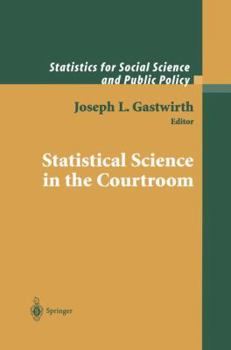Statistical Science in the Courtroom
(Part of the Statistics for Social and Behavioral Sciences Series)
Select Format
Select Condition 
Book Overview
In recent years, statistics has played in an increasing important role in the courtroom. Written at a popular level, this collection of articles by leading statistical consultants discusses the impact of testimony on the consultants, judges, and juries. The primary issue is how well the legal system accepts and interprets statistical evidence and how the recepton of this evidence by the legal process can be improved.
Format:Hardcover
Language:English
ISBN:B01MA1MUN8
ISBN13:9780387989976
Release Date:August 2000
Publisher:Springer
Length:443 Pages
Weight:1.80 lbs.
Dimensions:1.1" x 6.4" x 9.5"
Customer Reviews
1 rating
nice coverage of legal cases involving statisticians as expert witnesses
Published by Thriftbooks.com User , 16 years ago
Ever since the legal cases against the Census Bureau in 1980, statisticians have played a much more visible role testifying and providing depositions in legal cases. Due to the adversarial role lawyers play in trials we are seeing each side pit their expert statistician against the other. Many times the statistical evidence is confusing to the jury and/or the judges and the testimony tends to cancel out with verdicts being decided by other means. It is important to keep things simple. In the case about undercount adjustment for the Census in 1980, eminent statisticians argued on both sides. There was no right or wrong answer. Everything hinged on what statistical models you are willing to believe. Unfortunately, such cases revive the old adages that make statisticians kringe, "you can prove anything with statistics" and "lies, damn lies and statistics". With the advent of DNA evidence, statisticians are asked to compute matching probablities to determine the likelihood that a suspect is the person whose DNA was found at the crime scene. The results can be overwhelming but even a statistician with expertise in DNA matching can be tripped up by clever high priced lawyers. Such was the case when Bruce Weir testified on national television in the O. J. Simpson case. Joe Gastwirth has contributed to the statistical research applied to legal problems over the past 20 years at least and he has published a book on the subject. In this volume, he compiles a number of case stories and statistical issues in legal cases told by many very capable statisticians including Alan Izenman, Jay Kadane, Bruce Weir, Seymour Geisser, Don Rubin, Joe Gastwirth himself,David Pollard and Scott Zeger. These are all fascinating tales that will especially be appreciated by lawyers and statisticians. But this is also worthwhile reading for the general public. Read the preface, where Gastwirth gives you a synopsis of these articles. One of my favorites is the article by Seymour Geisser who tells a sad tale about how statistical issues relating to problems in the analysis of DNA evidence is covered up by the FBI. This is taken to the extent of influencing the refereeing process for journal publications, a shocking tale! Unfortunately even though DNA evidence can be as conclusive as a fingerprint, human error in processing the evidence can create doubt about the matching process or even pursuade a jury that evidence was planted or a defendant frame. Such things are possible and defense lawyers now exist who are up to the task of creating such doubt as was done masterfully by Johnny Cochran and Barry Scheck in the O.J. trial.





